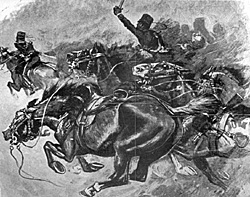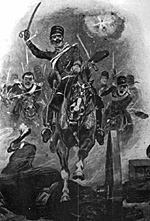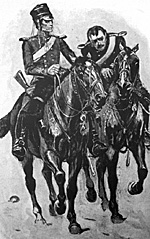
Soon after we had started, the wild rush of the living men was accompanied by maddened horses with emptied saddles."
The batteries poured in a fearful fire from these three quarters - straight ahead and on our right and left; and, in addition, there must have been great numbers of Cossacks and infantry in ambush on our night, because from that direction also a murderous fire was coming.
'Rushing into the 'Jaws of death' like that our men dropped from their saddles by dozens. Some were wounded, some were killed on the spot, and fell out of their saddles. There were cases of man and horse being literally blown to pieces by shells.
Soon after we had started, the wild rush of the living men was accompanied by maddedened horses with emptied saddles.
The first man to fall in the charge was the officer who, rightly or wrongly, had brought the order for it - Captain Nolan. He was ripped up the breast by a piece of shell and fell from his horse with terrible cries; but his foot got fixed in the stirrup and he was dragged for a considerable distance. Our own major - Major Halkett - was struck by a shell, or a cannon-ball, full in the chest and killed on the spot.
Very soon afterwards, my own chum, Tom Fletcher, was shot. He was a brave soldier and a splendid horseman; but the heavy fire was disorganising us, and he got a little behind me in his dressing - that is to say he was not level with me in the line. I shouted: 'Keep up, Tom!' The words were no sooner out of my mouth than I heard a whizz and a thud, and a bullet which had just grazed me struck him in the back of the head. But he held on. wounded though he was, and fought till he was taken prisoner. He lived for a little while, but died not long afterwards in the Crimea.
The Light Brigade was advancing in three lines - the 13th Light Dragoons and the 17th Lancers forming the first, the 4th Light Dragoons and l1th Hussars the second line, and the 8th Hussars the third. Lord Cardigan was in command, and led the first line; Colonel Douglas led the second, and Lord George Paget the third. The 17th had lances, the rest of us carried swords, although as light cavalry we had been through the lance exercises.
From our starting point to the place where the farthest guns - those at the lower part of the valley - were stationed was at least a mile and a quarter; and for the whole of that distance we rode through a perfect blaze of fire. So terrible was the flanking fire on our right and left, that when we had reached the bottom of the valley there were not more than about one hundred men remaining mounted.
 We literally flew at the batteries; but by the time we
got to the guns the first line of the Brigade had melted away. It had
been almost annihilated by shot and shell.
We literally flew at the batteries; but by the time we
got to the guns the first line of the Brigade had melted away. It had
been almost annihilated by shot and shell.
When we reached the battery we found that the gunners and drivers had limbered up their guns and were slowly retreating. We galloped up and surrounded them as well as we could with our shattered numbers, and stopped them from going.
Then the most terrible part of the whole mad business came. The gunners tried to escape from the fury of our men by crawling under the guns; but the drivers had not time to get away from their horses. They were sabred as they tried to dismount, and a good many of our own men dismounted and struck the Russians under their own guns or routed them out at the point of the sword. At such a time nothing could escape - men had no time to think, and the very horses were cut and stabbed and killed. So far as my own recollection goes there was not a man or horse who escaped alive in the whole of the battery.
Many of our men were fighting dismounted, their horses having been killed by fire or steel. some of them performed prodigies of valour, amongst them being Sam Parkes, a private of my own regiment. When we were mixed up with the guns Parkes was on foot, his horse having been killed. He was surrounded by Russians and fought like a demon. In a curious way he got level with his officer, for he disobeyed an order. He was going for a Russian, and for some reason the officer shouted: 'Spare him, Sam!'
But Parkes was far too busy looking after his own skin, and the Russian had to go. He fought as long as he could, and then had to take his choice between surrender or being cut to pieces. He surrendered and was made prisoner, but not until his sword had been smashed by a shot.
The Russians kept him for twelve months, then he was released, and was awarded the Victoria Cross for valour during the fight. For many years he lived at the Marble Arch, where he was the attendant. Six Victoria crosses were, given for the charge of the Light brigade, and three for the 'Heavies' - nine in all. No fewer than three of them went to the 17th Lancers.
We had captured the guns fairly enough, and for a short time they were actually in our possession; but the Russians were seen to be hurrying up large bodies of troops to rob us of the fruits of our charge. The enemy was seen by our officers.
Lord George Paget shouted to Colonel Shewell, commanding the 8th: 'We must rally on the Lancers, men! ' evidently believing that a body of Lancers had advanced to our support. He was at that time looking up the valley - the ' Valley of Death.'
One or two of our men, amongst them a sergeant called Andrews, shouted back, 'But they're Russian Lancers!' Then Lord George replied that we must hold together and cut our way through them; and the order was given to go about and retire.
That, indeed, was the only thing we could do, because it was clear that the handful of men who were still lucky enough to be living could do nothing against the Russian masses who were now in motion against us.
To stay where we were was to be cut to pieces - and for nothing - in as much as we had no supports, and could not take the guns away. As for supports, it was fortunate in a way, that we were without them; for if they had advanced they would have been served in the same way as the Light Brigade. There would have been no help for it, because the odds were so overwhelmingly against us.
When we went about we made for the Lancers, whom we now saw clearly enough. They were drawn up in a line right across the valley, not far from the points at which the flanking batteries on our right and left were placed.
Our horses were utterly winded, and terribly distressed with the galloping and charging down the valley for more than a mile. It was impossible to get them to go very fast; but the remnants of the five regiments obeyed the order to hold together, and went at the Russian Lancers.
As we came back I saw the officers commanding the Russians waving, their swords as if they were trying to bring the flanks of the Lancers round, so as to hem us in; but they seemed to me either to be afraid to move, or not to know what their officers were driving at. It was, of course, a disgraceful thing that they allowed a single man of us to get back again down the valley. Strictly speaking, not a soul in the Light Brigade should have been permitted to return, in view of the superior numbers of the enemy, their freshness, and our own exhausted state.
 "I did get him through luckily and when we were safely back I saw
him taken off his horse"
"I did get him through luckily and when we were safely back I saw
him taken off his horse"
We rushed in amongst them, and there was a renewal of the cutting. slashing, pointing, and parrying of the earlier part of the fight. There was no fancy work, but just hard, useful business, and it fulfiled its object, for we cut our way through the opposing lancers.
There was a repetition of a savage thing that hap pened as we dashed down in the beginning - the Russian batteries continued to blaze away even when we were mixed up with their own people, and destroyed friend and foe alike. It was merciless butchery so far as their own soldiers were concerned, though it was fair enough in our case, as we were the object to be destroyed.
In addition to this artillery fire we had to bear the fire of the hundreds of Cossacks who were hovering on our flanks. Many a man who had gone through the charge in safety fell before the Cossacks' fire.
The charge had caused us to be scattered and utterly disorganised and separated, so that we retreated pretty well anyhow and as best we could.
Many a friend was missing, and some that I thought I should never see again were found. There was one amongst them, a member of my own troop, that I did not expect to set eyes on, but I over-took; him during our retreat.
"I saw that something was wrong, as he was terribly pale, so I said: 'Hello, Bill, what's the matter? - Are you hurt?'
He said: 'Yes, I am; I'm shot through the foot.'
'Here, old boy,' I told him, 'you must get out of this. Hang on to the saddle and give me the reins. I'll get you through.'
I did get him through luckily, and when we were safely back I saw him taken off his horse. He was removed to one of the hospital ships in Balaklava Harbour, doctored, and invalided home. He wrote me a letter afterwards to say that he had heard I had got my first step towards being a general. So I had - I had been promoted to corporal.
A few lucky ones amongst us got safely back - and a melancholy return it was! Ages seemed to have passed since we charged down the valley, and yet the whole of the desperate business had been done well within half-an-hour.
We staggered in, some singly, some in twos, and some in threes; and the way we were met and cheered and helped showed how stunned those were who had been left behind, and had seen us going, on an under-taking that looked like sheer madness and certain death for every man and horse.
The fire which had pretty well destroyed us had caused the Heavy Brigade some further losses, as they were on the slope behind us, and in the line of fire. That we should have suffered even more than we did at the finish is certain if it had not been for the action of some French cavalry, who advanced and silenced some of the Russian guns.
We were back at last - but what a hand full ! When we turned into our tents at night some of them were perfectly empty, for not a single man belonging to them was alive; while others, which had sheltered twelve soldiers in the morning, now held only two. The camp seemed quite deserted, and the shadow of death lay heavy upon it. Some of our brave fellows were, we knew, prisoners in the hands of the Russians, because their horses had been shot down, they were themselves wounded, and escape was impossible; but most of the missing were dead.
Between six and seven hundred of us had charged down the valley; when we were mustered for the roll-call it was found that half were missing, and when the final returns were prepared, it was shown that in that charge of a few minutes' duration 247 officers and men had been killed or wounded or were missing, while of the horses 475 had been killed and forty-two were wounded.
Never To Be Forgotten Night
A never-to-be-forgotten night followed the day of the charge. The survivors turned into the tents, exhausted and miserable; but all the same I know that there was not a man who had come out of the charge who thought he had done anything more than his duty, and if the rest of the Light Brigade had been ordered to form up again for another charge not a man would have disobeyed.
Fully dressed and armed, with horses saddled and picketed to the ropes, we turned into our tents, and lay down to try to sleep A wild and disturbing thing happened. In the middle of the night we were startled by a terrible shouting and commotion. The officers-were halloing, and the guards were shouting ' Turn out ! Turn out ! The Russians are upon us !
We roused up and rushed out of the tents to our horses. As we were getting the bits into their mouths I heard an officer shout: ' By -, men, turn out, or we shall be cut to pieces !' Almost as he spoke, a hundred or a hundred and twenty horses galloped madly right into our camp; but, luckily, although they were Russian, they were riderless. They were loose horses which had stampeded. All we had to do was to capture them as best we could.
On the morning after the charge, our men who had been taken prisoners by the Russians were paraded before the Russian general, Liprandi, who spoke very good English. He asked the men if they had had anything to eat, and was astonished when they said they had charged on empty stomachs. He gave them plenty to eat and drink, and saying that he thought they would, no doubt, like to write to their mothers and wives and sweethearts, he had them provided with ink and pens and paper.
He asked, ' What did you men have to drink this morning before you came down in the charge?' They told him,' Nothing.'
Oh,' he said, ' I thought you were all drunk or mad!'
Then an Irishman said to him: 'By -, General, if we'd had anything to drink we should have had half Russia by this time!'
The general laughed and answered: 'Well, my man, if they were all like you, I believe you would ! '
I do not remember the case of the butcher of the 17th Lancers, who, you say, joined his regiment fresh from the shambles, and rode through the charge with his pole-axe; but I can tell you of a case as amazing, in its way, and one which shows the brutal discipline of the Crimea period.
Fox Flogging
There was a man in our regiment named Fox. When the order to advance was given he was on duty in the camp. He rushed to his horse, rode in the charge and came safely back. And to what? The eat ! He was court-martialled for Leaving his post without orders and sentenced to receive fifty lashes.
The remnant of the 4th was paraded for the degrading and monstrous punishment, and Fox was tied to the wheel of a forge-cart. One of the farriers took a cat-o'-nine-talls and gave twenty-five strokes. At that time, when flogging was in vogue in the army, one man never gave more than twenty five lashes, then a new man and a fresh cat were obtained.
When half the punishment had been given the colonel said: 'Hold! I will forgive you the other twenty-five.' Fox who was an Irishman answered: 'Oh, don't. Please colonel, I don't want to be beholden to you for anything. I'll take the other twenty- five ! ' The colonel said sternly: ' Silence, sir,' and had him marched off to the hospital marquee. The balance was never given. Fox was a desperate character, and a rough customer to deal with, it was true; but he was a line soldier, and, considering what he had gone through, his punishment was out of all pro-portion to his crime.
After Balaklava we were under the command ofthe French General, D'Allenville, at Eupatoria. We tried very hard to get the Russians to have another brush with us, but they would never face us again.
It has always been a disputed point as to whether the trumpets sounded the 'Charge! ' or not. The order was, ' Walk ! ' then 'Trot!' The men found that they were passing through such a murderous fire that they all wanted to get at the enemy as soon as possible. Accordingly they began to gallop and from the gallop they broke into the charge. But I never heard any 'Charge' sounded, and other survivors bear me out in this statement.
Section 1: Charge of the Light Brigade
Back to Age of Empires Issue 14 Table of Contents
Back to Age of Empires List of Issues
Back to MagWeb Master List of Magazines
© Copyright 1998 by Partizan Press.
This article appears in MagWeb (Magazine Web) on the Internet World Wide Web.
Other military history articles and gaming articles are available at http://www.magweb.com